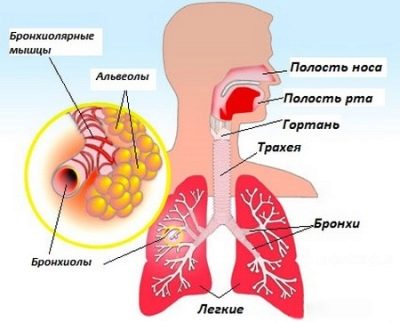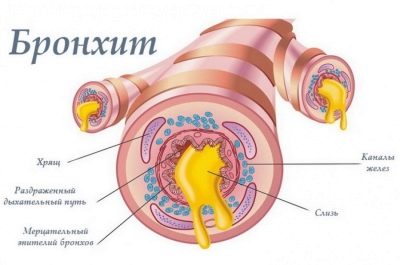Psychosomatics of bronchitis in children and adults
Bronchitis is a disease that is widespread, and in most cases it is peculiar to children. It should be noted that not every patient develops bronchitis after suffering a cold or viral disease. It happens that in his appearance can be clearly traced psychological pattern.
In this article we will talk about the psychosomatic causes of bronchitis.
general information
Bronchitis is an inflammatory disease in which bronchial membranes are drawn. Most often, the inflammatory process begins in the upper respiratory tract - in the throat or nasopharynx, and gradually goes down to the bronchi. The task of the bronchi in the body is to carry air to the lungs, which is already sufficiently warmed and moistened so as not to damage the lung tissue. When the bronchial membrane inflames, their conductivity is disturbed, breathing becomes difficult, even the risk of pneumonia develops, if the infection falls even lower - into the lungs themselves.
Bronchitis has characteristic clinical symptoms: first, a child or an adult has a dry cough, then he changes his character to a wet one, the temperature rises, breathing becomes difficult, shortness of breath appears, the patient experiences marked general weakness, he has a headache and sleep is disturbed. In children, on the background of a painful cough, the gag reflex is often activated.
Bronchitis is acute or chronic. The acute form (catarrhal) with timely and correct therapy recedes in a couple of weeks, the bronchi recover in about a month. In the chronic form of the disease, inflammation is constantly present, periods of remission are replaced by periods of exacerbation. Chronic bronchitis is considered to last for more than three months. Gradually suffers not only the functional work of the bronchi, but also their structure.
Obstructive bronchitis is a separate topic. It is associated with bronchial edema and severe breathing problems, often some of the bronchi are blocked with sputum.
In traditional medicine, the main causes of bronchitis are infections that are associated with a viral disease (for example, with SARS), bacterial infection of the respiratory tract.
It is believed that the disease is favored by certain hereditary factors, weak immunity, smoking, living in regions with very polluted air.
Psychosomatic causes
Psychosomatics respects the official medical explanations of the causes of bronchitis in children and adults, but looks at the problem somewhat more widely - not only in terms of anatomy and physiology, but also in view of the human mental state.
To understand why a person has bronchitis, and why he is difficult to treat with traditional medications, you need to clearly know what exactly the bronchi do - they are ways to transport air into the lungs. On the way, the inhaled air is humidified and warmed. Also, the bronchi can regulate how much air enters the lungs due to its natural ability to expand and contract.
It is this unique ability of the bronchi that is regulated in the body by the parasympathetic nervous system, and it is in close connection with the mental and emotional state of a person. The bronchi in psychosomatics symbolize life force.
If a person is depressed and passive in life, his bronchi relax and also begin to work only in half of their strength. Breathing loses depth, becomes more superficial, bronchial lumen stays in a constricted state, increases the likelihood of inflammation of the bronchial mucosa.
Bronchi, according to psychosomatics, act as "intermediaries" between the personal world of a person, how he sees him, and the world around him, as he is in essence. Any problems in the interaction of the two worlds immediately affect the health of the organs of the respiratory system. If a person with a positive and kindly accepts the world and people in it, an event, then usually there is no problem with breathing.
People who are painfully related to the outside world, do not trust him, who see him as a threat to themselves, limit breathing with a full breast themselves, at the psychological level cause bronchoconstriction, disruption of their lumen, obstruction, and, as a result, bronchitis.
Psychotherapists have long noticed that respiratory diseases are more often affected by people who do not want to be open to the world. They self-isolate, close, make sure that no one and nothing outside could violate these personal boundaries they have built. The parasympathetic system, taking the signal that outside is dangerous, limits the lumen of the bronchi, which increases the likelihood of illness. Obstructive bronchitis is most often associated with a person’s almost panic fear for their own safety.
That is why adolescents and children most often suffer from bronchitis, among adults in the group of patients vulnerable and impressionable people prevail, prone to dramatize the events and actions of other people, as well as their own experiences.
With bronchitis, a child may respond to the need to get used to the new society — when they begin to attend kindergarten or school. At first, the baby may experience discomfort or even resentment at the parents for being sent to a foreign team, which will manifest itself on the physical level by accumulation of sputum, from which the child can get rid of only in one way - coughing.
If the offenses are large, and the difficulties in communicating with the outside world are also impressive, then the amount of sputum begins to exceed the child's ability to eliminate it, and the inflammatory process in the bronchi develops.
In adults, bronchitis is often the result of selfishness, laziness, unwillingness to accept the requirements of society. Adults with chronic forms of bronchitis are usually very unhurried people with high self-esteem and a desire to disclaim responsibility for any important decisions. It is convenient for them when decisions are made by others, because in case of failure, responsibility will be given to these others.
The very thought of taking everything under control and doing everything as you like frightens such people and causes them to be rejected. With great difficulty, they accept everything new, be it the new boss at work or the innovations of technical progress. They breathe only half the volume of their lungs, their breathing is usually very shallow, shallow, as the therapist states at the reception, where a person with enviable regularity comes on the occasion of another exacerbation of chronic bronchitis.
Opinion researchers
Psychologist and researcher in the field of psychosomatics Louise Hay argued that the main cause of bronchitis lies in the family - quarrels and loud frequent scandals and disputes create a complex situation and force a child who grows in such circumstances to close from the world, which leads to long-lasting and chronic diseases, including bronchitis.
Canadian writer and psychologist Liz Burbo emphasizes the close connection between the psychosomatic significance of the bronchi and the family, relatives, and family tree (the bronchi look like a tree). She is confident that the child's bronchitis is always based on the child’s worries about what is happening in the family.As for adults, chronic or acute bronchitis is peculiar to those of them who cannot tolerate what is happening in the family, but at the same time have no opportunity (strength, courage) to enter into open confrontation, express their opinion, designate their position, rebel against.
The psychotherapist Valery Sinelnikov sees the main cause of children's bronchitis in the excessive authoritarianism of his parents, while the child’s personality is in fact suppressed by his relatives, but he cannot formulate and express his own opinion. Negative words that ripen in the child's head, the protest speech in this case is formed, but not expressed, and comes out of it with a cough. The psychology of the disease involves the reversibility of processes - the elimination of the root cause removes the symptoms and leads to full recovery.
Treatment
There is not much difference, who has bronchitis (in an adult or in a baby), an adult will still have to work on eliminating the causes. Children's bronchitis is an obvious signal for parents to reconsider their relationship, change the style of communication. If this is impossible and the opposition has reached its apogee, it is possible that a peaceful and peaceful divorce will be the best way out.
The story knows many cases when a child who is a chronic patient with bronchitis recovered after the family situation was discharged after the departure of one of the parents, when the scandals stopped. But if it is possible to save the marriage, it is better to do just that.
Parents are urged to stop making increased demands on the child, which are very difficult for him to meet. No one in the world should meet someone’s expectations. If the adults understand this and enable the baby to be himself, then he will be able to cope with bronchitis as soon as possible.
Similarly, you should not make increased demands on the rest of the household, adults.
An adult with bronchitis needs to learn to trust others more, and first of all the members of his family. Only openness, honesty and sincerity will help to start breathing deeply, getting pleasure from communication, and then you can forget about bronchitis.


















